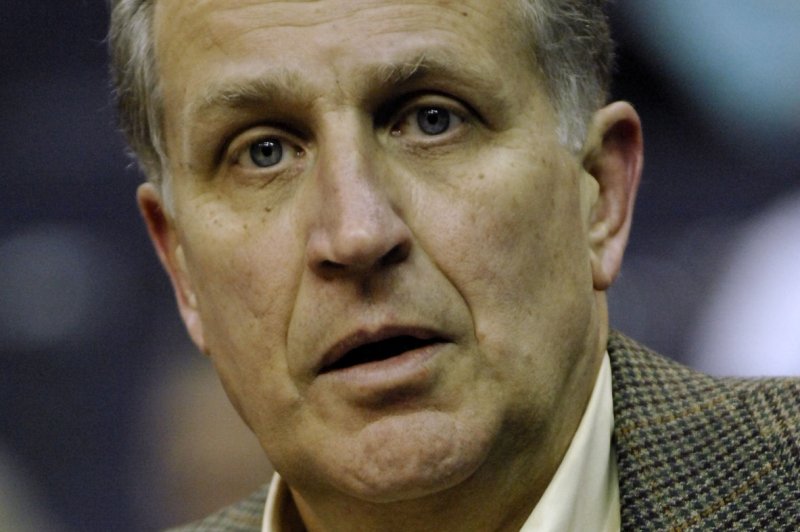Former NFL commissioner Paul Tagliabue. (UPI Photo/Mark Goldman) |
License Photo
When the selection committee of the Pro Football Hall of Fame meets on Saturday in Houston, we can be sure of only one thing: The most heated discussion will not involve one of the 15 former players on the ballot.
No, the lightning rod will be Paul Tagliabue, the former commissioner, who led the league through a period of prosperity and labor peace that critics say was marred by giveaways to the players in labor negotiations and a blind eye to health concerns caused by concussions.
It's not the first time Tagliabue's career will be scrutinized by the 48-member committee. But it's the first time he will be given a simple yes-or-no vote on his Hall of Fame candidacy; in the past, he was competing against players in preliminary voting rounds and never made it to the finals.
Under a change in the voting procedure a couple of years ago, a separate "contributor" category was added, and this year Tagliabue and Jerry Jones, the Dallas Cowboys owner, are the nominees in that category.
Jones probably would be a controversial nominee in his own right, because his team hasn't won anything meaningful for more than two decades and his major contribution to the league has been in making money, not in improving the game on the field. But the expected debate over Tagliabue (Jones will be discussed first) might temper the discussion regarding Jones, who has also made some questionable comments about concussions.
Selection to the Hall of Fame requires 80 percent approval by the committee, which means that Tagliabue and the others must receive at least 39 of the 48 votes. Ten negative votes ding a candidate.
Hardly anyone around the NFL is neutral in judging the Tagliabue era, with strong opinions on both sides. Owners and players appreciate how he kept the money coming and the league going strong without the disruptive strikes that marred the last decade of the tenure of his predecessor, the sainted Pete Rozelle. And it's not hard to find his supporters who point out the many issues surrounding and sometimes created by, his successor, Roger Goodell.
Goodell was a popular choice for commissioner among the media, who control the voting and used to find him much more personable than the gruff and arrogant Tagliabue. But Goodell's tenure has been a disappointment to many and makes Tagliabue look that much better in retrospect.
Tagliabue has the support of NFL alumni groups, who credit him with instituting a plan that reimburses medical and living expenses for former players with certain diseases, such as ALS and dementia, that could have resulted from playing football.
Under Tagliabue's leadership as commissioner, the NFL also adopted rules that enhanced opportunities for minority coaches, and today there are eight minority head coaches in the NFL. A quarter-century ago, there was one.
But Tagliabue's reign as commissioner was not without controversy. Critics said that labor peace came at a price, that he yielded too much to the players union in negotiations to keep that peace and that led to the lockout in 2011. Also, he was overruled by a group of owners when he attempted to negotiate a rebate of television revenue to the networks because they complained the NFL deal was too pricey for them -- and the dissidents were proved correct when rights fees continued to increase.
Furthermore, Tagliabue was also unable to solve the California conundrum, which continues to this day, the nation's largest state an unsettled bloc on the NFL landscape with franchise shifts involving San Diego, Los Angeles and potentially Oakland. And media members, who control the voting, chafed at Tagliabue's condescending manners to them.
The most serious argument, however, centers around a question that has resonated since the Watergate scandal in Washington more than four decades ago: What did he know, and when did he know it, about the danger of head trauma and concussions in professional football.
Critics say Tagliabue helped cover up and downplay the dangers. Supporters say he was behind changes in rules and injury handling protocols that make the game safer. It should all make for lively discussion at the Hall of Fame's annual selection meeting the day before the Super Bowl.
The key question that can be asked about the other candidate as a contributor, Dallas owner Jones, is what he did to make the game better -- as opposed to helping teams and players make more money by leading the way in many marketing initiatives.
Probably the surest bet on the 18-man ballot is former Seattle safety Ken Easley, the nominee of the Hall's veterans committee for players whose careers ended at least 25 years ago. The only knock on Easley was a short career (seven years), but he was a five-time Pro Bowl player and defensive player of the year in 1984.
Kurt Warner, one of only three quarterbacks to start a Super Bowl for two different franchises, is a finalist for the third time and finally may get his call. Warner played in three Super Bowls and has the three highest passing yardage totals in the game's history.
LaDainian Tomlinson, the league's No. 5 all-time rusher, is a first-time finalist considered likely to be inducted. The same cannot be said of Terrell Owens, whose receiving yardage total is exceeded only by Jerry Rice. Owens, a finalist for the second year in a row, was such a disruptive teammate that two teams, San Francisco and Philadelphia, got rid of him at the peak of his career.
The Hall of Fame decisions will be announced Saturday night.
Ira Miller is an award-winning sportswriter who has covered the National Football League for more than five decades and is a member of the Pro Football Hall of Fame Selection Committee. He is a national columnist for The Sports Xchange.















